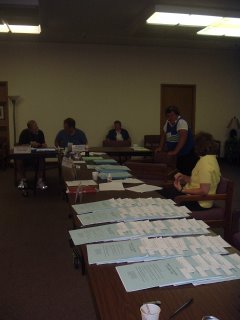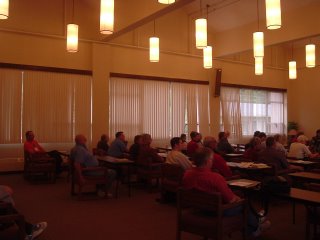Every year - twice a year - hundreds of Presbyterian pastors-to-be take exams to help determine their readiness to begin pastoral ministry. There are several key words in that phrase. Let me try again:
Every year - twice a year - hundreds of Presbyterian pastors-to-be take exams to help determine their readiness to begin pastoral ministry.
There - that's better. These exams - called Ordination Exams - are the bane of every Presbyterian student in Seminary. There are 4 exams in this bunch which, together with the Bible Content Exam, let the Presbyteries know how students are doing. Most Presbyteries use the results of these exams as a way to label students - pass the tests and you're given the OK to accept a call and be ordained, fail - and you have to wait and take that test again.
The four exams are: Theology, Polity, Worship & Sacraments, and Biblical Exegesis. So, the exams are meant to make sure that we are:
- Theologically sound - we're not going to start teaching heresies to our congregations
- Presbyterian in Polity - we're going to lead our congregations in a way that is appropriate for our system of government (very similar to the US government)
- Clear in our understanding of Worship and Sacraments - since the title we are seeking is "Minister of Word and Sacrament" - this section is half of our calling. They are trying to make sure we understand the decisions that our denomination has made in relation to worship and administration of sacraments.
- Exegetically secure - that we know how to read and interpret scripture, using the 'original' languages of Greek and Hebrew.
Once the exams are taken, they are sent to Louisville, to our denominational "mother ship" to be sorted and organized. Then, they are sent off to various locations around the country to be graded. The grading happens in a group setting by a large number of people selected from the Presbyteries to be a part of this Reading Group. The readers of the exams are pastors and elders in the church who have been elected - part of our representative government.
This year, I was invited to be a Student Observer of the process. The idea is that I would gain knowledge about what the grading process was like - and about who the graders are as people - to hopefully dispell some rumors and de-mystify the process of grading. I think the idea is that, upon my return to school, I will be able to assist students in studying for the exams in the future.
So - I went. Back in October. I missed all of week 4 of the quarter - that was interesting. But... it was a great experience! I really enjoyed the time there - and feel like I am WAY more prepared to take the exams. And I really hope that I can share some of what I learned with my fellow Presbys.
So many things to share... I think I'll make a list:
- The readers are nice people!! This is really important to understand. They are not out to get us, they are not getting kicks failing us. They stressed over the process of reading as much as students stress over the process of taking these exams. I met one woman who didn't sleep the night before because she was concerned about having the power to "ruin" the life of a student - at least until the next exam was offered.
- The readers treat this as an act of worship. Every day begins with a worship service. I often saw readers praying over the exams they were grading. One reader shared with me that he prays over every exam and, if he gets to the end of the exam and can't decide if it should pass or fail - he prays again. He, and everyone else, wants the Spirit to be the one doing the work here, not themselves.
- The readers prepare ahead of time. The conveners (who wrote the questions) prepare resource papers for the readers with information about how the question was intended to be answered. One reader mentioned that he actually takes the exams at home on his own and then compared his answers with the resource papers in order to determine what it is that he is looking for from the exams. The readers come to the Reading group with their homework done. Trust me - these people are well-prepared!
- The readers actually read the papers and work to make sure they give the examinee every benefit. There are people there whose job is to administer the process and to be a resource for the readers. The readers often came into the convening room with questions and concerns - wanting to make sure that what they are reading is OK.
- The process is designed to offer the examinee every opportunity for fairness. The papers are each read twice... and if they don't agree (one passes, one doesn't), the paper is read a third time. We track the number of the examinee through the process so that no reader will read more than one paper from each person.
And my friends at the reading group had messages that they wanted me to bring back to my friends here. So, in their own words (for the most part):
- READ AND ANSWER THE QUESTION!! Please make sure that if you are to answer 6 questions in the Exegetical portion that you actually do that. And if it has to be at least one from each section - don't skip a section. It may sound silly - but I saw them fail papers... papers that would have gotten a 5 (the highest grade) failed - because only 4 questions were answered instead of 6.
- At the end of each page - re-read the question you think you are answering and make sure you're still answering that question. It is SO easy to get off track - and if you end up not actually answering the question at hand, you will fail - no matter how well-written and theologically sound your answer may be.
- Read and answer the question.
- Type the exam, if at all possible. The handwritten ones were not graded down, but it certainly started you off on a bad foot. At this point in our technological advancements - you must know someone with a laptop that you can borrow for a weekend. The caveat here is that, if you use a 'puter - SPELL CHECK! A pericope is not the same thing as a periScope - and that just makes you look stupid.
- Read and answer the question.
- Make sure to make the references that you are required to make. If you do not have 3 references from 3 different documents, you will fail - no matter how well-written and theologically accurate your answer is.
- Read and answer the question.
- Remember the purpose of these exams. Your audience is pastors and elders. You are not writing an exegetical paper for your Exegetical Methods prof. These exams are to test your readiness to begin pastoral ministry - they want to see your pastor's heart as much as your academic mind. Connect the theological/academic stuff to your pastoral answers - that's how the questions read, that's what they're looking for!
- Read and answer the question.
- One last thing....
READ AND ANSWER THE QUESTION!!!!
OK - so I sounded a bit like a broken record. But I hope you got the point. It was heart-breaking to watch readers come into the conveners room asking for someone to look through an exam. They were praying, praying, that the convener would find the answer to a question hidden somewhere within the pages of the booklet. They were so upset to have to put a 2 (a failing grade) on a paper that was beautifully written, theologically sound, obviously pastoral - and missing one reference. They know how hard you worked on it - many of them have taken the exams - but they cannot ignore the requirements. And neither should you.
So, that was my experience. I have a few pictures:
Our pile of Worship & Sacraments exams

In process on the Exegesis exams - this is the conveners room. The process is fun - I can tell you about it sometime.

Pictures of the main room where we worshipped and where the majority of the grading happened. At this moment we are having a plenary session discussing what we are looking for on the Exegesis exams and reading through a sample.


We spent the week at the Mercy Center - a convent in the San Francisco Bay area. This is my 'cell'.







